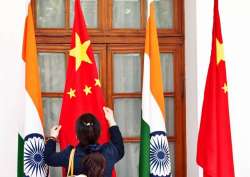Beijing’s claims on Arunachal Pradesh meaningless: Chinese scholar
China claims Arunachal Pradesh as "South Tibet" and in April Beijing had announced Chinese "standardised" names for six places in retaliation to Tibetan spiritual leader Dalai Lama's visit there.

In an unusual move, a Chinese strategic analyst has questioned Beijing's "national obsession" with Arunachal Pradesh, saying that the state is only a "chicken rib" and hardly an "asset" for the country.
China claims Arunachal Pradesh as "South Tibet" and in April Beijing had announced Chinese "standardised" names for six places in retaliation to Tibetan spiritual leader Dalai Lama's visit there. The Chinese state media had said the move to rename the places was aimed at reaffirming China's claim over the state. But Union minister of state for home affairs Kiren Rijiju, who accompanies the Dalai Lama to Arunachal, had made clear that the state is "an inseparable part of India".
The Dalai Lama's visit to Arunachal was the seventh since he fled from Tibet through Tawang and sought refuge in India.
"Although China and India have been in a rocky relationship over the disputed territory for years, the disputed territory, which has been a national obsession, is hardly an asset to China," Wang Tao Tao said.
"In realistic terms the area is just a chicken rib for China," Wang wrote on the popular Chinese website zhihu.com - which is akin to Quora - mostly covers security matters.
Interestingly, the article came at a time when India and China have been engaged in a border standoff for more than a month after Chinese troops tried to construct a road in Doklam area in the Sikkim sector. India has protested the move saying it would allow China to cut India's access to its northeastern states.
Social media websites and blogs - like the zhihu.com - have become popular over the years in China, where millions access them on their mobile phones.
"The territorial dispute between China and India is essentially meaningless, because this disputed territory for India and China, not only difficult to development, but the moral, economic, political and management costs are extremely high," Wang said.
"In this case, it is hard for China to actually go to war with India for these chicken ribs as long as it does not hamper security interests," he said, suggesting that any contest over Arunachal will have adverse impact on rest of the Tibet potentially strengthen separatist forces.
"Objectively looking, the potential for separation in Tibet could become more powerful," he said.
Wang said China has failed to fully address Tibetan identity issues. "While the land of southern Tibet is very different from the bitter cold in northern Tibet, agriculture is relatively
developed, will also virtually strengthen the ability of Tibetans to support themselves," Wang said.
Moreover, the area is vulnerable to attacks and cannot provide superior strategic depth and security interests for China's inland like the vast Tibetan plateau, he said.